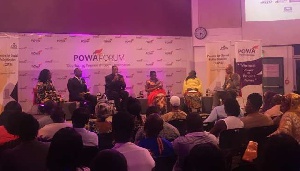 The panelists at the event advised women to take up challenging roles
The panelists at the event advised women to take up challenging roles
The Progressive Organization for Women Advancement (POWA) has called on women in the country to be actively involved in party politics and contribute to the policy-making in the country.
Speaking at the second edition of its forum Monday, July 23, Executive Director of POWA, Victoria Lakshmi Hamah stressed the need for women to be supported and encouraged to engage in politics so as to bridge the gap between them and their male counterparts. This she says will aid in achieving social justice and sustainable well-being.
“Historically, women have been marginalized and thus require special support in order to achieve social justice and sustainable well-being. It is necessary that women participate in the politics of our country and be recognized as true and active patriots like their male counterparts. That is why this year’s dialogue at this forum is to digest, probe, classify and discover whether the Ghanaian media has impacted positively or negatively in Ghanaian women in politics,” she added.
A five-member panel comprising Prof. Audrey Gadzekpo, Ivor Greenstreet, Nana Oye Lithur, Madam Elizabeth Ohene and ace journalist Paul Adom-Otchere expressed their views on the theme of the forum which was; “How has the media impacted on the participation of Ghanaian women in politics?”
Prof. Audrey Gadzekpo opined that the media has failed in ensuring that women who aspire to get into politics have the necessary platforms and visibility to do so.
The former Gender Minister, Nana Oye Lithur on her part believes that most media organisations in Ghana today are operating as business entities, thus, focusing on driving traffic to their portal by any means possible even through the publication of sensational headlines just to get readers, viewers and listeners attention. She urged the National Media Commission (NMC) to establish new code of ethics that will sanction journalists and media guests who cook up stories or give false information.
2016 flag bearer of the Convention People’s Party (CPP), Ivor Greenstreet on his part asserted that women are constantly relegated to the background by their colleague men in politics because of the power they wield. He further called on political parties to give more roles to women to motivate increased participation.
“The NPP appointed more women than NDC in the last election, men are afraid of women becoming too powerful. We need the affirmative action bill. There is a law that 30% of workers in a firm should be women. Unfortunately, POWA would be shocked that if they did a research they would discover that the law is not being abided to,” Greenstreet said.
He added, “So far we have tried training, mentoring but finance is the greatest problem we face. The affirmative action is a decentralization process whereby parties are directly involved to get women take up major roles in the party. We had people who violated rules during the 2012 elections but we solved it with determination and it brought sanity to the previous elections. As we move to 2020 women participation must be 50%.”
Ghanaian journalist, Paul Adom-Otchere who also sat on the panel commended past governments for preserving some key roles such as the Electoral Commission, Attorney General and other positions for women in the country.
Mr. Adom-Otchere also established that since it has been ‘scientifically proven that women are more capable of multitasking than men,’ it would be easier for them to aim higher and achieve more.
Former Minister of State in charge of Tertiary Education, Elizabeth Ohene who spoke about the challenges women face in combining gender roles and their political ambitions disputed the assertion that women are not capable of assuming positions in the media due to their domestic responsibilities. She said while men have the luxury of contributing to morning shows, women are mostly faced with the task of engaging in household chores and other responsibilities which hinder them from also contributing.
Commenting on the significance of social media by media personality Eric Don-Arthur who moderated the forum, Madam Ohene said, “Akua Donkor is the danger of what women face. Some even claim she is not serious, but there are many men who are also jokers in politics. However, women in politics should take advantage of technology to help them get first hand news and share their views, so their opinions will have weight.”
Finalizing the debate, Prof. Abena Oduro of the Centre for Social Policy Studies (CSPS) at the University of Ghana mentioned that, “the media has a major role to play in facilitating women entry into politics. It informs the views of electorates and therefore can influence the electorate’s decision on who to vote for.
“A study conducted some years ago in Ghana found that women were underrepresented in media coverage. When women are reported in the media, how are they represented? Which traits of women vying for leadership positions are portrayed? Are the traits that are portrayed those which will increase their chances of being selected by the electorates? When they are in leadership positions, are women’s achievements highlighted and discussed?”
The event which was held at the British Council was heavily attended by the public.